Volatility, Growth and Financial Crises
This research group analyses the build-up of financial vulnerabilities and real consequences of financial crises. Different policy shocks and the causal reaction of macroeconomic aggregates are identified. Early-warning models describe the cyclical nature of financial vulnerabilities.
IWH Data Project: Financial Stability Indicators in Europe
Research Cluster
Financial Resilience and RegulationYour contact

- Department Macroeconomics
EXTERNAL FUNDING
01.2022 ‐ 12.2023
Sovereign Risk Shocks
05.2017 ‐ 09.2019
Early Warning Models for Systemic Banking Crises: The Effect of Model and Estimation Uncertainty
01.2018 ‐ 12.2018
International Monetary Policy Transmission
Refereed Publications
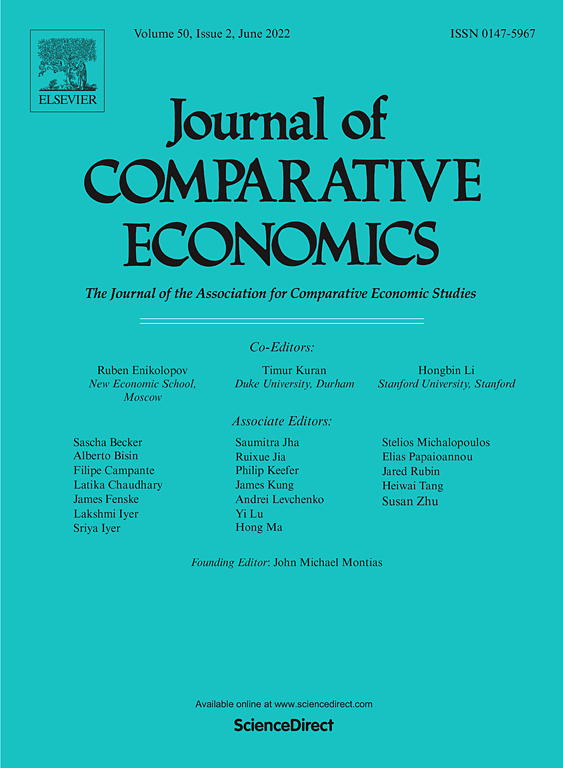
Sovereign Default Risk in the Euro-periphery and the Euro-candidate Countries
in: Journal of Comparative Economics, 2011
read publication
The Role of Uncertainty in the Euro Crisis - A Reconsideration of Liquidity Preference Theory
in: Journal of Post Keynesian Economics, 2013
Abstract
With the world financial crisis came the rediscovery of the active role fiscal policy could play in remedying the situation. More recently, the Euro Crisis, with its mounting funding costs facing governments of a number of Southern EU member states and Ireland, has called this strategy into question. Opposing this view, the main point of this contribution is to elaborate on the link between rising sovereign risk premia in the Eurozone and a major feature of the financial crisis - elevated uncertainty after the Lehman collapse. Theoretically, this link is developed with reference to Keynes' liquidity preference theory. The high explanatory power of rising uncertainty in financial markets and the detrimental effects of fiscal austerity on the evolution of sovereign risk spreads are demonstrated empirically by means of panel regressions and supplementary correlation analyses.
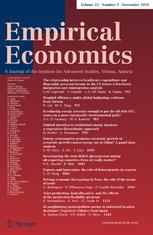
Evidence on the Effects of Inflation on Price Dispersion under Indexation
in: Empirical Economics, No. 1, 2012
Abstract
Distortionary effects of inflation on relative prices are the main argument for inflation stabilization in macro models with sticky prices. Under indexation of non-optimized prices, those models imply a nonlinear and dynamic impact of inflation on the cross-sectional price dispersion (relative price or inflation variability, RPV). Using US sectoral price data, we estimate such a relationship between inflation and RPV, also taking into account the endogeneity of inflation by using two- and three-stage least-squares and GMM techniques, which turns out to be relevant. We find an effect of (expected) inflation on RPV, and our results indicate that average (“trend”) inflation is important for the RPV-inflation relationship. Lagged inflation matters for indexation in the CPI data, but is not important empirically in the PPI data.
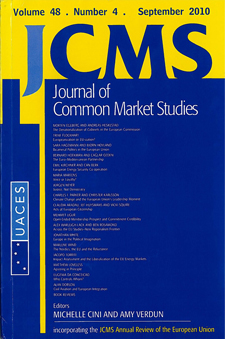
Macroeconomic Imbalances as Indicators for Debt Crises in Europe
in: Journal of Common Market Studies, No. 5, 2012
Abstract
European authorities and scholars published proposals on which indicators of macroeconomic imbalances might be used to uncover risks for the sustainability of public debt in the European Union. We test the ability of four proposed sets of indicators to send early-warnings of debt crises using a signals approach for the study of indicators and the construction of composite indicators. We find that a broad composite indicator has the highest predictive power. This fact still holds true if equal weights are used for the construction of the composite indicator in order to reflect the uncertainty about the origin of future crises.

Are Universal Banks Bad for Financial Stability? Germany During the World Financial Crisis
in: Quarterly Review of Economics and Finance, No. 2, 2012
Abstract
This case study explores the contribution of universal banking to financial stability in Germany during the recent financial crisis. Germany is a prototype for universal banking and has suffered from a rather small number of banking crises in the past. We review the banking literature and analyze the major institutional and regulatory features of the German financial system to establish a nexus between universal banking and stability.
Working Papers
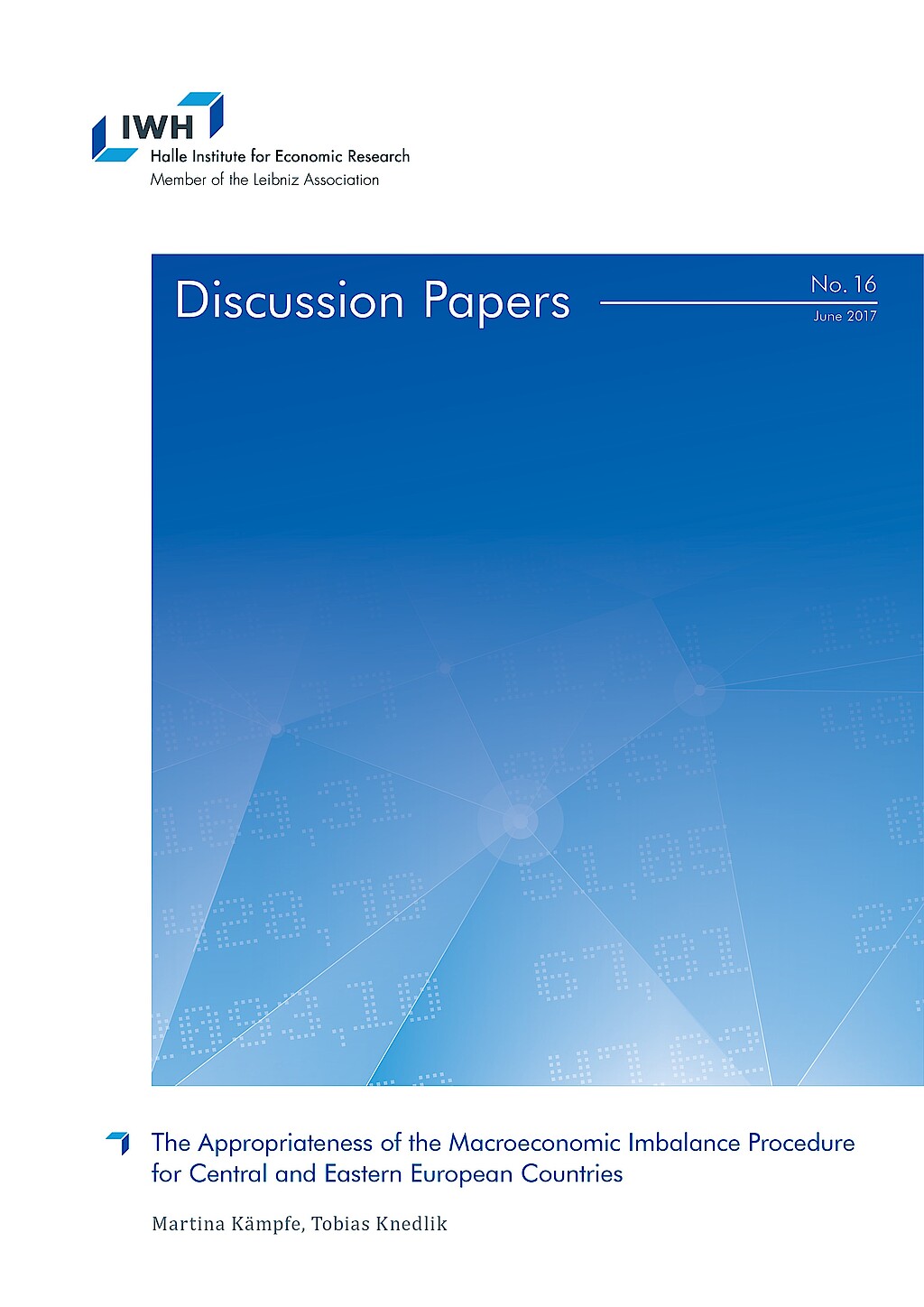
The Appropriateness of the Macroeconomic Imbalance Procedure for Central and Eastern European Countries
in: IWH Discussion Papers, No. 16, 2017
Abstract
The experience of Central and Eastern European countries (CEEC) during the global financial crisis and in the resulting European debt crises has been largely different from that of other European countries. This paper looks at the specifics of the CEEC in recent history and focuses in particular on the appropriateness of the Macroeconomic Imbalances Procedure for this group of countries. In doing so, the macroeconomic situation in the CEEC is highlighted and macroeconomic problems faced by these countries are extracted. The findings are compared to the results of the Macroeconomic Imbalances Procedure of the European Commission. It is shown that while the Macroeconomic Imbalances Procedure correctly identifies some of the problems, it understates or overstates other problems. This is due to the specific construction of the broadened surveillance procedure, which largely disregarded the specifics of catching-up economies.
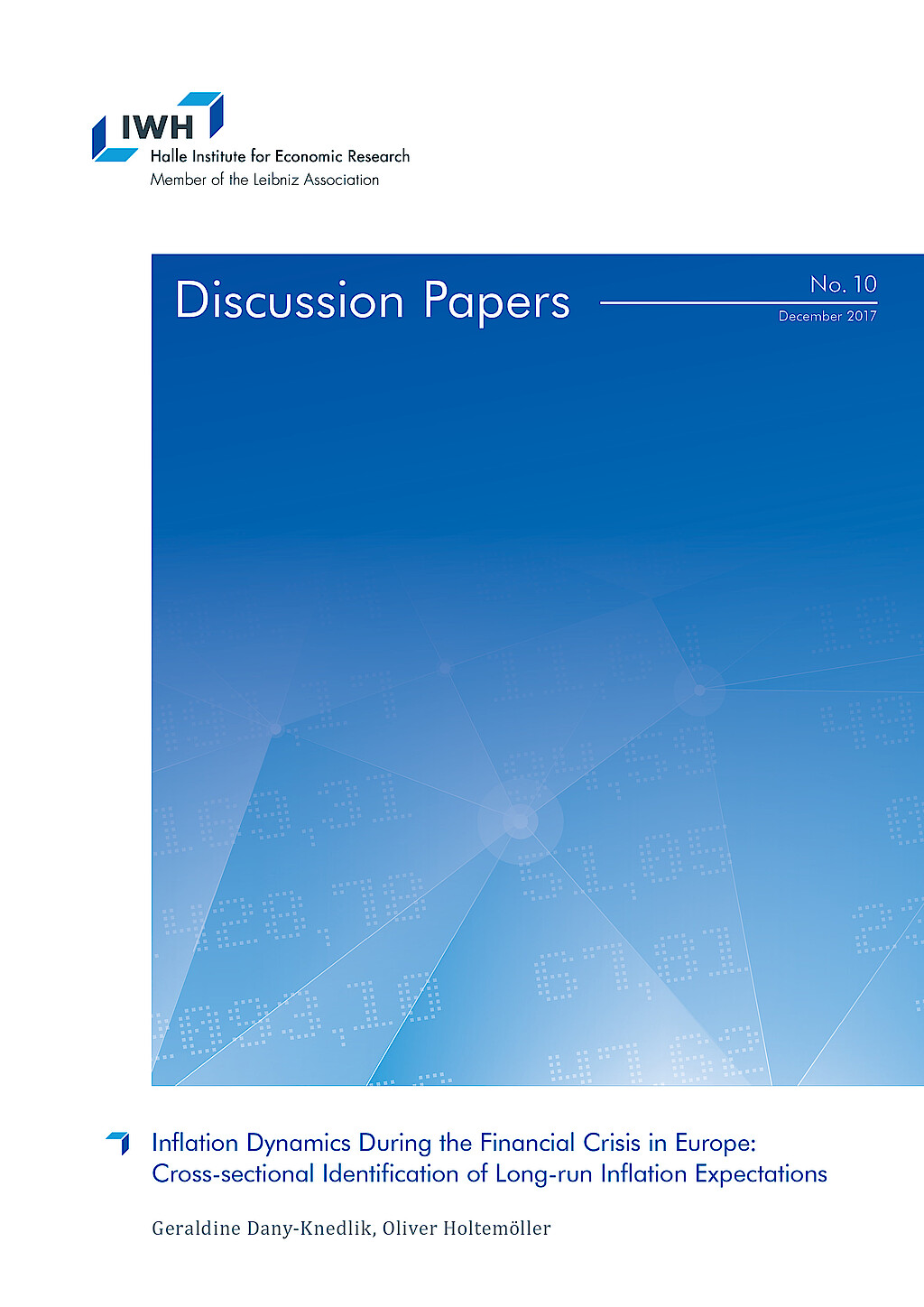
Inflation Dynamics During the Financial Crisis in Europe: Cross-sectional Identification of Long-run Inflation Expectations
in: IWH Discussion Papers, No. 10, 2017
Abstract
We investigate drivers of Euro area inflation dynamics using a panel of regional Phillips curves and identify long-run inflation expectations by exploiting the crosssectional dimension of the data. Our approach simultaneously allows for the inclusion of country-specific inflation and unemployment-gaps, as well as time-varying parameters. Our preferred panel specification outperforms various aggregate, uni- and multivariate unobserved component models in terms of forecast accuracy. We find that declining long-run trend inflation expectations and rising inflation persistence indicate an altered risk of inflation expectations de-anchoring. Lower trend inflation, and persistently negative unemployment-gaps, a slightly increasing Phillips curve slope and the downward pressure of low oil prices mainly explain the low inflation rate during the recent years.
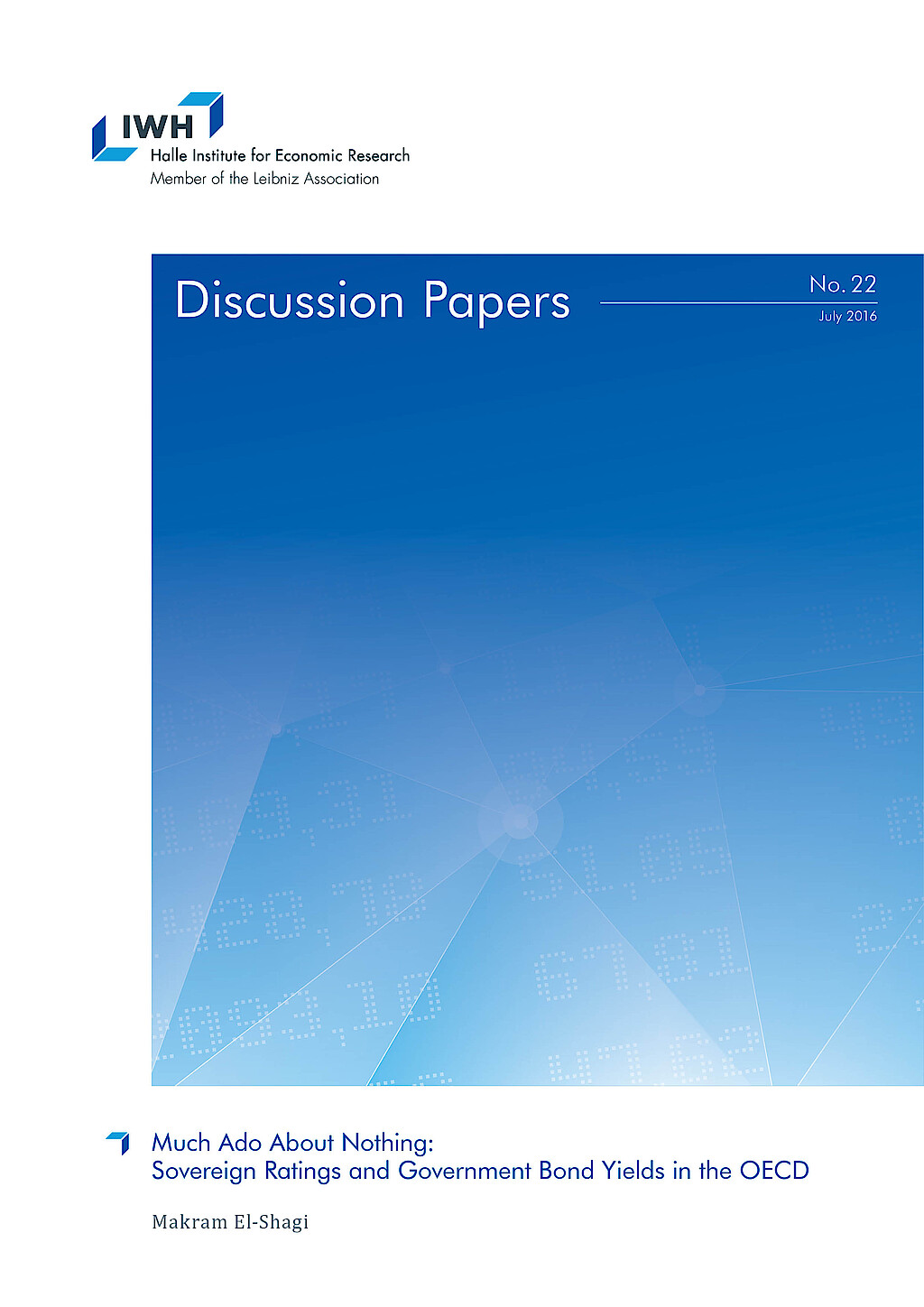
Much Ado About Nothing: Sovereign Ratings and Government Bond Yields in the OECD
in: IWH Discussion Papers, No. 22, 2016
Abstract
In this paper, we propose a new method to assess the impact of sovereign ratings on sovereign bond yields. We estimate the impulse response of the interest rate, following a change in the rating. Since ratings are ordinal and moreover extremely persistent, it proves difficult to estimate those impulse response functions using a VAR modeling ratings, yields and other macroeconomic indicators. However, given the highly stochastic nature of the precise timing of ratings, we can treat most rating adjustments as shocks. We thus no longer rely on a VAR for shock identification, making the estimation of the corresponding IRFs well suited for so called local projections – that is estimating impulse response functions through a series of separate direct forecasts over different horizons. Yet, the rare occurrence of ratings makes impulse response functions estimated through that procedure highly sensitive to individual observations, resulting in implausibly volatile impulse responses. We propose an augmentation to restrict jointly estimated local projections in a way that produces economically plausible impulse response functions.

Exit Expectations and Debt Crises in Currency Unions
in: IWH Discussion Papers, No. 18, 2015
Abstract
Membership in a currency union is not irreversible. Exit expectations may emerge during sovereign debt crises, because exit allows countries to reduce their liabilities through a currency redenomination. As market participants anticipate this possibility, sovereign debt crises intensify. We establish this formally within a small open economy model of changing policy regimes. The model permits explosive dynamics of debt and sovereign yields inside currency unions and allows us to distinguish between exit expectations and those of an outright default. By estimating the model on Greek data, we quantify the contribution of exit expectations to the crisis dynamics during 2009 to 2012.

Flight Patterns and Yields of European Government Bonds
in: IWH Discussion Papers, No. 10, 2013
Abstract
The current European Debt Crisis has led to a reinforced effort to identify the sources of risk and their influence on yields of European Government Bonds. Until now, the potentially nonlinear influence and the theoretical need for interactions reflecting flight-to-quality and flight-to-liquidity has been widely disregarded. I estimate government bond yields of the Euro-12 countries without Luxembourg from May 2003 until December 2011. Using penalized spline regression, I find that the effect of most explanatory variables is highly nonlinear. These nonlinearities, together with flight patterns of flight-to-quality and flight-to-liquidity, can explain the co-movement of bond yields until September 2008 and the huge amount of differentiation during the financial and the European debt crisis without the unnecessary assumption of a structural break. The main effects are credit risk and flight-to-liquidity, while the evidence for the existence of flight-to-quality and liquidity risk (the latter measured by the bid-ask spread and total turnover of bonds) is comparably weak.














